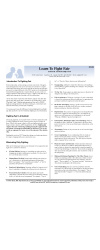Sponsor
Category: FAQ-Communication & Conflict

A lot of the conflict in our lives comes from HOW we communicate with others. Ineffective communication creates conflict even in situations where there is no real “conflict issue” or disagreement about a substantive issue. Poor communication causes hurt feelings, anger, frustration, and tends to erode relationships, sometimes to the point where the relationship is not fixable. Many times we call these situations personality conflicts, when in fact they are a result of poor communication.
Here’s the rundown on communication approaches that are guaranteed to create unnecessary conflict, and damage relationships at home and at work. They are based on the book, Conflict Prevention In The Workplace — Using Cooperative Communication, by Robert Bacal, but apply to communication and conflict in and out of work, and in intimate and family relationships.
What are extended attempts to win? (Communication that fails)
Attempts To Win an Argument Often Backfire and Create Poor Communication You may be familiar with the phrase “For every action there is an equal and opposite reaction”, taken from the world of physics. The same principle applies to communication,…
What is unsolicited advice? Why is it a communication killer?
Good intentions don’t always make effective communication or better relationships. You might mean well. You want to help. You offer advice to someone without being asked. They get mad. You get mad because the other person isn’t appreciating your effort….
What are blaming comments and why is the blame game pointless and destructive?
We live in a society that seems to value finding people to blame when things go wrong rather than to identify how to prevent things from going wrong again in the future. So, it’s not surprising that individuals often got…
What are overstatements and generalizations?
Blatant generalizations are essentially “overstatements”, or exaggerations, and usually contain words like always, never, every time, etc. Apart from the fact that these kinds of generalizations are almost always inaccurate, untruthful, or plain wrong, their use tends to provoke other…
What is guilt induction? How does it create conflict and poor relationships
People tend to resist attempts by others to manipulate their emotions and feelings. Guilt-induction attempts are efforts to make someone feel guilty or “less than”, often in an attempt to shame them into going along or changing. While guilt induction…
What is histrionic communication and behavior? (overdramatization)
Do you want to learn what to replace firestarter communication with? Conflict Prevention In The Workplace – Using Cooperative Communication teaches you what kinds of communication you need to eliminate, AND what to replace them with — techniques to reduce…






